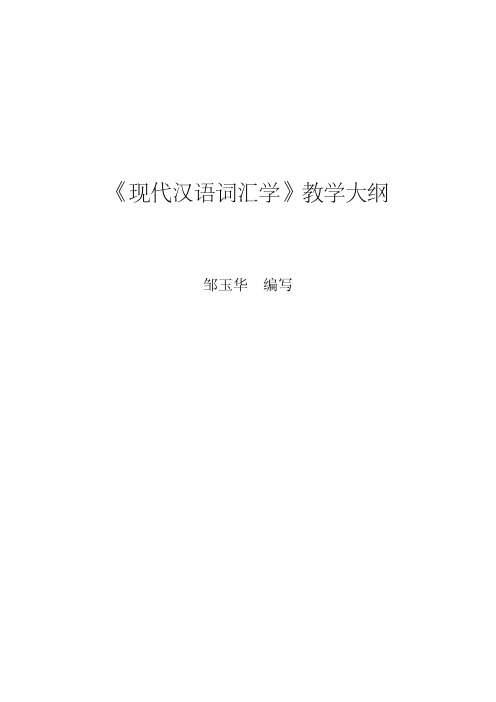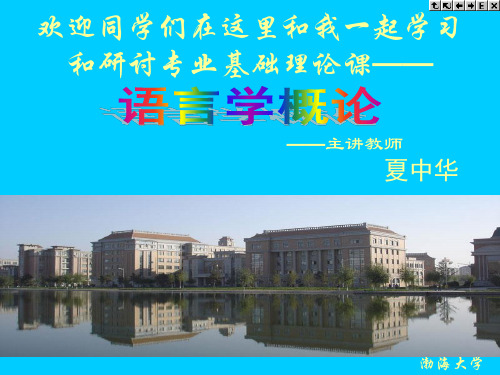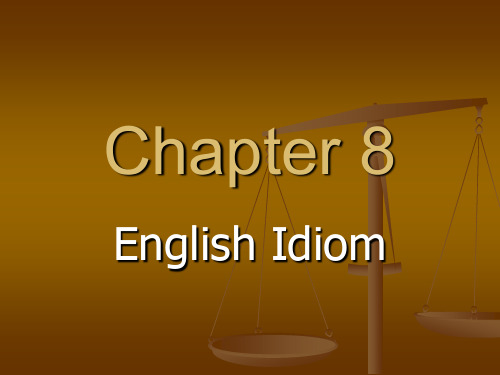词汇学 第七八章
词汇学_第七八章必考

词汇学_第七八章必考Chapter 7 Changes in Word Meaning7.0 Introductionglad : “ bright and shining ” ;meat: “ food in general” ;ready: “ prepared for ride”;bread: “ meat , a small piece”sports7.1 four major types of change:①extension of meaning②narrowing of meaning③elevation of meaning .④degradation of meaning.7.2 causes of change① the extra-linguistic factors②linguistic factors7.1.1. Extension of Meaning (or generalization ) (词义的扩大)▲extension of the word-range▲the widening of meaning which some words undergo▲t is a process by which a word which originally had a specialized meaning has now become generalized.e.g. paper-—from the Greek papyrus :an Egyptian plantby law —originally “ a village law.”pipe —a simple musical instrument; holiday,economy, sandwich7.1.2.Narrowing of Meaning ( or specialization) (词义的缩小)It is a process by which a word of wide meaning acquires a narrower or specialized sense, a words becomes restricted in its application and conveys a special meaning .e.g. hospital: lounge for travellersgirl: young personcity: business centre of Londonshroud: clothesgeneral: a general officer7.1.3.Elevation of Meaning ( or amelioration) (词义的升格)It refers to the process by which words rise from humble beginnings to positions of importance.e.g. marshal: a servant who looks after mares/keeper of horseminister: servantnice: ignorant, foolishfond: foolish7.1.4 Degradation of Meaning ( or degeneration) (词义的降格)It is a process whereby non-affective words come to be used in derogatory sense. it is much more common for word meanings to change in denotation from neutral to pejorative than it is for them to go the other way.e.g.sad: calm, serious -------- sorryfulcunning: knowing a skillful-------- gossip , crafty.wench: girl, young woman-------- a loose woman , prostitute boor : peasant -------- ill-mannered person7.1.5. Transfer词义的转移( in learning theory ) the carrying over of learned behaviour from one to situation to anther. [(学习理论中)指将学会了的行为从一种情境转移到另一种情境。
词汇学目录

IntroductionChapter 1 Basic Concepts of Words and V ocabulary1.1 What Is a Word1.2 Sound and Meaning1.3 Sound and form1.4 V ocabulary1.5 Classification of Words1.5.1 Basic Word Stock and Nonbasic V ocabulary1.5.2 Content Words and Functional Words 1.5.3 Native Words and Borrowed Words Questions and TasksChapter 2 The Development of the English V ocabulary2.1 The Indo-European Language Family2.2 A Historical Overview of the English V ocabulary2.2.1 Old English (450-1150)2.2.2 Middle English (1150-1500)2.2.3 Modern English (1500-up to now)2.3 Growth of Present-day English V ocabulary 2.4 Modes of Vocabulary Development Questions and TasksChapter 3 Word Formation I3.1 Morphemes3.2 Allomorphs3.3 Types of Morphemes3.3.1 Free Morphemes3.3.2 Bound Morphemes3.4 Root and StemQuestions and TasksChapter 4 Word Formation II4.1 Affixation4.1.1 Prefixation4.1.2 Suffixation4.2 Compounding4.2.1 Characteristics of Compounds4.2.2 Formation of Compounds4.3 Conversion4.4 Blending4.5 Clipping4.6 Acronymy4.6.1 Initialisms 4.6.2 Acronyms4.7 Back-formation4.8 Words from Proper NamesQuestions and TasksChapter 5 Word Meaning5.1 The Meanings of ‘Meaning’5.1.1 Reference5.1.2 Concept5.1.3 Sense5.2 Motivation5.2.1 Onomatopoeic Motivation5.2.2 Morphological Motivation5.2.3 Semantic Motivation5.2.4 Etymological Motivation5.3 Types of Meaning5.3.1 Grammatical Meaning and Lexical Meaning5.3.2 Conceptual Meaning and Associative MeaningQuestions and TasksChapter 6 Sense Relations and Semantic Field 6.1 Polysemy6.1.1 Two Approaches to Polysemy6.1.2 Two Processes of Development6.2 Homonymy6.2.1 Types of Homonyms6.2.2 Origins of Homonyms6.2.3 Differentiation of Homonyms from Polysemant6.2.4 Rhetoric Features of Homonyms6.3 Synonymy6.3.1 Definition of Synonyms6.3.2 Types of Synonyms6.3.3 Sources of Synonyms6.3.4 Discrimination of Synonyms6.4 Antonymy6.4.1 Types of Antonyms6.4.2 Some of the Characteristics of Antonyms 6.4.3 The Use of Antonyms6.5 Hyponymy6.6 Semantic FieldQuestions and TasksChapter 7 Changes in Word Meaning7.1 Types of Changes7.1.1 Extension7.1.2 Narrowing7.1.3 Elevation7.1.4 Degradation7.2 Causes of Changes7.2.1 Extra-linguistic Factors7.2.2 Linguistic FactorsQuestions and TasksChapter 8 Meaning and Context8.1 Types of Context8.1.1 Extra-linguistic Context8.1.2 Linguistic Context8.2 The Role of Context8.2.1 Elimination of Ambiguity8.2.2 Indication of Referents8.2.3 Provision of Clues for Inferring Word-meaningQuestions and TasksChapter 9 English Idioms9.1 Characteristics of Idioms9.1.1 Semantic Unity9.1.2 Structural Stability9.2 Classification of Idioms9.2.1 Idioms Nominal in Nature9.2.2 Idioms Adjectival in Nature9.2.3 Idioms Verbal in Nature9.2.4 Idioms Adverbial in Nature9.2.5 Sentence Idioms9.3 Use of Idioms9.3.1 Stylistic Features9.3.2 Rhetorical Features9.3.3 Variations of IdiomsQuestions and TasksChapter 10 English Dictionaries10.1 Types of Dictionaries10.1.1 Monolingual and Bilingual Dictionaries 10.1.2 Linguistic and Encyclopedic Dictionaries10.1.3 Unabridged, Desk and Pocket Dictionaries10.1.4 Specialized Dictionaries10.2 Use of Dictionaries10.2.1 Choice of Dictionaries10.2.2 Content of the Dictionary 10.2.3 Use of the Dictionary10.3 Three Good General Dictionaries10.3.1 Longman Dictionary of Contemporary English(LDCE) New Edition (1987)10.3.2 Collins COBUILD English Language Dictionary(CCELD) (1987)10.3.3 A Chinese-English Dictionary (Revised Edition) (CED) (1995)Questions and TasksSuggested AnswersReference Books英语词汇学术语英汉对照表后记英语词汇学自学考试大纲'。
词汇学第七章

血液中葡萄糖——
(二)结构是以名称(固定词组)的结构为
基础
支部书记—— 扫除文盲—— 土地改革——
(三)构成方式 1.取名称(固定词组)中每个词里的第一个字 中国共产党——
化学肥料——
2.取名称(固定词组)第一个词的第一个字,第
二个词的第二个字 整顿作风—— 战争罪犯——
偶发词语是在具体的语言活动中,为了 达到一定的修辞目的,临时创造的一种词语。
家庭妇女
—— 家庭妇男
偶发词语对具体的语言环境或上下文依附性
强,脱离上下文则往往不被理解或接受。
二、偶发词语的构成
遵循一般的构词构语规律,多在既有词语的基础上,
因形就势,改变既有词语的个别成分或结构。
1.既有词语个别成分的更动(套用)形成的 先进——后进
3.取名称(固定词组)前部分的第一个词 清华大学——
北京大学——
中国人民志愿军——
4.取名称(固定词组)后部分的最后一个词 中国人民解放军——
5.取名称(固定词组)中每个词的一个字,再把
有类别性质的词附在后面 文艺工作团—— 少年先锋队——
6.取名称(固定词组)中最有代表性的两个字
中国作家协会—— 7.取名称中的第一个字(必须在与另一名称连用时)
新加坡、马来西亚、泰国——
8.省略并列几个词中的相同词素 中学、小学——中小学 加利福尼亚州——加州 第四女子中学——女四中
军属、烈属——军烈属 奥林匹克运动会——
9.包含外来词的名称可只取头一个音节(字)
一般由数词和其他词(动词、名词、形容词
等)两部分构成。
1.前部分数词的数额取决于联语中相同词的
《现代汉语词汇学》教学大纲

第五章 词义和语境的关系................................................................................................................... 670 一、语境对理解词义的作用 ................................................................................................... 670 二、语境对词义的影响 ........................................................................................................... 670 复习与思考题........................................................................................................................... 670 拓展阅读书目........................................................................................................................... 670
第一节 语言的社会属性

请同学们思考下列问题
一、语言的本质属性是什么?应该怎样 理解? 二、语言不是个人现象,为什么会有 “鲁迅的语言”、“老舍的语言”的说 法?
三、为什么说语言是一种特殊的社会现 象?
2.1.2语言与社会的关系
语言是社会现象,可以从以下两个方面证明: 1.音义结合的任意性和世界语言的多样性说明语言是 社会现象。 2.语言与社会的关系说明语言是社会现象。
(1)语言依存于社会。社会是语言产生和发展必备件。 (2)社会需要语言。语言是社会的重要组成部分。
2.1.3语言社会属性的特殊性
19世纪,受达尔文生物进 化论影响,比较盛行的一种观 点。以德国语言学家施莱赫尔 为代表。他在《达尔文学说与 语言学》一书中把达尔文关于 物种起源和发展的学说运用于 语言学领域,认为语言是属于 施莱赫尔(1821-1868) 自然界范围。
德国语言学家
语言不是自然现象
1.语言的发展过程与自然界生物生长老死的过程有 本质区别。
第二章第二章语言的本质语言的本质第三章第三章语音学语音学第五章第五章词汇学词汇学第六章第六章语法学语法学第七章第七章语用学语用学第八章第八章语言的发展语言的发展第九章第九章文字学文字学第一章第一章绪绪论第四章第四章语义学语义学右上角按钮功能说明
欢迎同学们在这里和我一起学习 和研讨专业基础理论课——
——主讲教师
(一)社会属性中包含了自然因素和个人成分 (二)语言是非经济基础的社会现象 (三)语言是非上层建筑的社会现象
语言不是上层建筑
1.经济基础有适合于它的上层建筑,上层建筑随着经济基础的变化而变 化,语言不是这样。 2.上层建筑只为自己的经济基础服务,语言则一视同仁地为各个经济基 础、各个阶级服务。 3.上层建筑生命不长久,语言生命长久。 4.上层建筑与生产及人的生产行为没有直接联系,语言与生产及人的生 产行为则有直接联系,因为它是人类的交际工具。
英语专业词汇学第8章

3. Idioms Adjectival in Nature形容词性习语: Nature形容词性习语: They function as adjectives in a sentence. e.g.: cut and dried wide of the mark up in the air
Formation of Adjectival Idioms
Chapter 8
English Idiom
Objectives:
To discuss the characteristics of idioms; idioms; To explain their classification and uses. uses.
Teaching Focus:
The Characteristics of Idioms The Classification of Idoms The Uses of Idioms
Formation of Verbal Idioms
D. Verb + Noun + Prepositional Phrase keep the wolf from the door (keep out hunger), pull the wool over one’s eyes (fool someone into one’ thinking well of you) E. Verb + Noun + Preposition get the jump on (get ahead of), pick holes in (find a mistake or things wrong with) F. Verb + Adjectives go easy (go or act slowly), come clean (confess)
词汇学第七讲

• In many cases meaning is used in concept, concept is the result of human cognition which reflects the objective world in the human mind, it is universal to all men alike regardless of culture and race although it can have many referring expressions as there are languages in the world.
• while sense denotes the relationships inside the language, since sense of an expression is not a thing, it has no certain identity, every word that has meaning has sense but not every word has reference. such as“ nearly, and, if ” have senses but refer to nothing in the world.
– One thing worth pointing out is that the morphemes, the component parts of these words are themselves conventional. And, there are a lot of words whose structures are opaque, whose meanings are not the combinations of the constituent parts. E.g. “black sheep”,“green hand”te over the connection between sound and meaning
英语词汇学课件 Unit 7

7.1 Synonymy & synonym
7.1.1 Definition synonymy: the relation between two lexical units with a shared meaning. synonym: A word that is equivalent in sense to another word (in a particular context or contexts) E.g. select/choose • Will you help me choose a new suit? • I don’t choose to wait.
7.1.2 Classification
perfect/absolute synonyms Partial/relative synonyms
同义关系不仅存在于单个词之间,还可能存在于成语之间
decide to/make up one’s mind to/be determined to
7.1.3 Source of synonyms
7.1.4 Differentiation
denotative/conceptual meaning extend, increase, expand rich, wealthy; want, desire • • • • associative meaning answer / respond cop / policeman He is one of the greatest/biggest lyric poets in the world. Look at that lovely little/small/tiny boy.
E.g. rich/poor, big/small, husband/wife
- 1、下载文档前请自行甄别文档内容的完整性,平台不提供额外的编辑、内容补充、找答案等附加服务。
- 2、"仅部分预览"的文档,不可在线预览部分如存在完整性等问题,可反馈申请退款(可完整预览的文档不适用该条件!)。
- 3、如文档侵犯您的权益,请联系客服反馈,我们会尽快为您处理(人工客服工作时间:9:00-18:30)。
Chapter 7 Changes in Word Meaning7.0 Introductionglad : “ bright and shining ” ;meat: “ food in general” ;ready: “ prepared for ride”;bread: “ meat , a small piece”sports7.1 four major types of change:①extension of meaning②narrowing of meaning③elevation of meaning .④degradation of meaning.7.2 causes of change① the extra-linguistic factors②linguistic factors7.1.1. Extension of Meaning (or generalization ) (词义的扩大)▲extension of the word-range▲the widening of meaning which some words undergo▲t is a process by which a word which originally had a specialized meaning has now become generalized.e.g. paper-—from the Greek papyrus :an Egyptian plantby law —originally “ a village law.”pipe — a simple musical instrument; holiday,economy, sandwich7.1.2.Narrowing of Meaning ( or specialization) (词义的缩小)It is a process by which a word of wide meaning acquires a narrower or specialized sense, a words becomes restricted in its application and conveys a special meaning .e.g. hospital: lounge for travellersgirl: young personcity: business centre of Londonshroud: clothesgeneral: a general officer7.1.3.Elevation of Meaning ( or amelioration) (词义的升格)It refers to the process by which words rise from humble beginnings to positions of importance.e.g. marshal: a servant who looks after mares/keeper of horseminister: servantnice: ignorant, foolishfond: foolish7.1.4 Degradation of Meaning ( or degeneration) (词义的降格)It is a process whereby non-affective words come to be used in derogatory sense. it is much more common for word meanings to change in denotation from neutral to pejorative than it is for them to go the other way.e.g.sad: calm, serious -------- sorryfulcunning: knowing a skillful-------- gossip , crafty.wench: girl, young woman-------- a loose woman , prostituteboor : peasant -------- ill-mannered person7.1.5. Transfer词义的转移( in learning theory ) the carrying over of learned behaviour from one to situation to anther. [(学习理论中)指将学会了的行为从一种情境转移到另一种情境。
]1) Associated Transfer (联想转移)通过联想而产生词义转移, 即原指称某一事物的词后来转指称另一事物的演化过程。
figurative extensione.g. the lip of a wound / a cupthe tongue of a bell / of firethe teeth of a saw / a combthe nose of a plane /a ship2) Transfer between abstract and concreteE.g. room: a. spacec. three roomsgrasp: a. a firm hold with the hands and armsc. power or ability to understand ( She seems to have a good grasp of the subject.)3) Transfer between subjective and objective(主语性意义和宾语性意义/ 主观意义和客观意义)e.g. pitiful : s. full of pity ( He shows pity on others.)o. deserves pity ( On whom others show pity )dreadful : s. full of dreado. causing dread4 ) Synesthesia (通感)它是跨越不同的感官将自己的思想情感物化的结果。
通感与客观现实有时并不一致, 但通感是审美的需要, 是从“以眼观物”发展到“以心观物”的必然结果。
Words usually associated with one sense are used to describe another sense.e.g.(1) Thai curry tastes hot. 泰国的咖哩菜很辣。
(从温觉映射至四味觉)(2) Orange is warm color. 橘黄色为暖色。
(从温觉映射到视觉)(3) She scolded with sharp voice. 她尖声尖气地责备着。
(从触觉映射到听觉)(4) His voice was a censer that scattered strange perfumes 他的嗓子是香炉,散发着奇特的芳香。
(从嗅觉映射到听觉)(5) 灯光冷于水。
(刘驾《秋夕》) (用“寒”和“冷”这种温觉来描写“光”)(6)许多女人会笑得这样甜,但他们的笑容只是面部肌肉的柔软操……(《围城》)(7)sweet music : from taste to hearingwarm colour : from touch to sightindicate the speaker‟s attitude : hot line, cold war, a warm/ cold welcome7.1.6 Euphemismthe use of a word which is thought to be less offensive or unpleasant than another wo rd.委婉是语言中的一种文化现象,是特定的文化所决定的特殊语言行为。
“绕道而行”的方式,降低语言的“难以接受性”。
被称之为comfortable words(安慰词)或cosmetic words(美化词)e.g. Chinese: butcher (卖肉的)American or England: meat technologist(肉食技师)Chinese:大便次数American or England: the times of movementfree love (非法同居):trial marriageI llegitimate child (私生子):love childto die : to pass away ,expire, bite the dust, kick the bucket, give up the ghost, to depart, to go to heavenhave sex with: make love withindisposed (欠安)instead of sickpoor: needyabout sex(有关性的知识): the facts of lifeProstitution (卖淫):the oldest profession in the worldChapter 8 Meaning and ContextQuestions and Tasks:1. What is context ?2. How many types of context are there in English?3. What is the function of context ?4. In which ways does context affect the meaning of words?8.0 IntroductionWithout context, there is no way to determine the meaning that the speaker intends to convey.With context, there is generally no danger of misinterpretation.e.g. Shakespeare: Julius CaesarBrutus: Not that I loved Caesar less, but I loved Roman more.Antony: When that the poor have cried, Caesar hath swept:Ambition should be made of sterner stuff.Y ou all did loved him once, Not without cause.What cause withholds you then to mourn for him?O judgement ! Thou art fled to brutish beasts,And men have lose their reason. Bear with me:My heart is in the coffin there with Caesar…Meaning lives in context and the context throws light on meaning.语言学家胡壮麟(1994)把语境归结为三类:(1)语言语境,即上下文(context),指语篇内部环境;(2)情景语境(situational context),指语篇产生时的环境,事件的特征、性质和谈话的主题、时间、地点、方式等;(3)文化语境,指作者所在的语言社会团体的历史文化和风俗人情。
